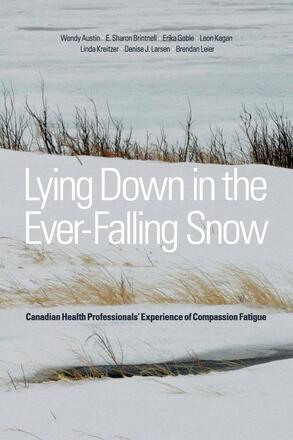
Lying Down in the Ever-Falling Snow
Canadian Health Professionals’ Experience of Compassion Fatigue
Description
Compassion fatigue from the perspective of insiders in caregiving roles
First used to describe the weariness the public felt toward media portrayals of societal crises, the term compassion fatigue has been taken up by health professionals to name—along with burnout, vicarious traumatization, compassion stress, and secondary traumatic stress—the condition of caregivers who become “too tired to care.” Compassion, long seen as the foundation of ethical caring, is increasingly understood as a threat to the well-being of those who offer it.
Through the lens of hermeneutic phenomenology, the authors present an insider’s perspective on compassion fatigue, its effects on the body, on the experience of time and space, and on personal and professional relationships. Accounts of health professionals, alongside examinations of poetry, images, movies, and literature, are used to explore the notions of compassion, hope, and hopelessness as they inform the meaning of caring work. The authors frame their exposé of compassion fatigue with the very Canadian metaphor of “lying down in the snow.” If suffering is imagined as ever-falling snow, then the need for training and resources for safe journeying in “winter country” becomes apparent. Recognizing the phenomenon of compassion fatigue reveals the role that health services education and the moral habitability of our healthcare environments play in supporting professionals’ ability to act compassionately and to endure.
Reviews
“The seven authors form ... an impressive interdisciplinary team.... To the extent that this book brings the reality of compassion fatigue to our collective awareness, there is reason to hope that increased understanding can promote avoidance of compassion fatigue for many as well as the amelioration of the suffering of those who become afflicted.... The discussion of hope does much to enlarge our comprehension of the processes that underlie the ‘fatigue’ condition. Hope is seen as necessary for compassion, but hope repeatedly denied without adequate conditions for restoration is a damaging experience.... The authors present a thoughtfully detailed discussion of what can be done to lessen and prevent the suffering and loss caused by compassion fatigue.... The depictions of the emotional life of caregivers afford invaluable experience for the reader, perhaps even an enlargement of one’s emotional compass. From a more functional view, the accounts can serve as a stimulus for analysis of the process of caregiving itself, which could foster a more sensitive institutional management, both self and organizational.... The authors have collaboratively created a comfortably readable text, effectively smoothing any disjunctions, so that the reader is given an eminently readable, finely woven work.”
- David S. Hart
“This book should be required reading in the education of all health and human service professionals. Although technical and therapeutic expertise is a core foundation of competent, ethical, and safe practice, education often neglects compassion fatigue as a central aspect of human relationship. Also neglected is the meaning of human suffering—much to the consistent detriment of service providers and those for whom they care, particularly in the context of increased market-driven healthcare. This book can create the foundation for much-needed open conversations about these pressing issues.”
- Elizabeth McGibbon, Ph.D., RN, editor of <i>Oppression: A Social Determinant of Health</i> (2012)
“This book offers a refreshingly honest viewpoint, exploring the phenomenon of compassion fatigue from the perspectives of a variety of Canadian health professionals, discussing their feelings and how work can affect them.... Given the potential for risk reduction by educating future practitioners on how to recognize and address compassion fatigue, either in themselves or their colleagues, this book should be a core text for all universities that teach occupational therapy.”
- Samantha Pywell, University of Central Lancashire